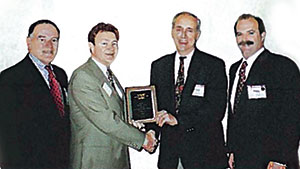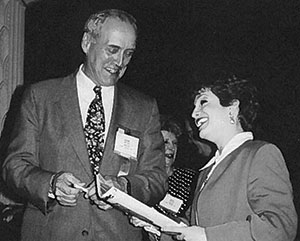P&Q Hall of Fame Profile: Bernie Grove
Operations leader paved way for industry on social issues.
Pioneer. Mentor. Class act.
These are just a few of the words colleagues of Bernie Grove choose to describe the longtime Genstar leader and former chairman of the National Stone Association.
“Bernie was a real visionary,” says Kim Snyder, the recently retired Eastern Industries president who at one time worked alongside Grove at Genstar. “He was so knowledgeable about the industry and the operational end. He was one hell of an operator.”
According to Snyder, Grove was also an industry leader in a number of other areas, including community relations, the environment and gender equality during the 1970s and 1980s. As NSA chairman and through a number of the association’s committees on which he served, Snyder says Grove led a cultural shift for the industry.
“If you look back at NSA, now NSSGA (the National Stone, Sand and Gravel Association), a vast majority of the past chairmen came through the government affairs division or the environmental end,” Snyder says. “The whole focus was predominantly operational and focused on plant design [before Grove]. Then the focus became funding for highway systems, environmental stewardship and building community relationships.”
Leading the shift
The cultural shift for the industry was one that first took place at Genstar. Under Grove’s leadership, for example, the company’s attitude toward the surrounding community changed.
“There was a philosophy among companies before this time that the best thing you could do as an aggregates operation was to sit back very quietly and try to act as if you didn’t exist,” says David Thomey, executive vice president of Maryland Materials, who worked closely with Grove through NSA and the Maryland Aggregates Association. “The approach was to be very secretive and private.”
Grove cast aside that concept in favor of an unproven approach: He welcomed the community to get to know Genstar.
“He wanted people to know that his company was there and the community was not alone,” Thomey says. “He wanted the community to know Genstar was somebody to come to when things needed to get done and there were times of need.”
Grove, whose career at Genstar spanned nearly 40 years, started a community day as part of his mission. Each year, Genstar’s quarries would host a picnic, inviting neighbors and elected officials so they could be informed on that respective location’s activities. In addition, Genstar could address the community’s concerns at these events.
“He got the social contract better than anybody at the time,” Thomey says of Grove. “The fact that we were operating only because of the good graces of the communities in which we lived was a [foreign concept] at the time. He was the one who, early on, got that and understood that things would go much better from a permitting standpoint if we were upfront.”
Although Grove was the first to grasp this concept, he convinced other companies to embrace it through his association work.
“Community days and community relations are fundamental to what we do now,” Snyder says. “Bernie was absolutely one of the leaders not just in Maryland, but on a national level. He got it so there was some real traction on this in the industry.”
Grove, who served Genstar as vice president of operations and later as president, made national headway on environmental stewardship, as well.
“Genstar had some pristine quarries in regards to aesthetics and how they looked to the general public,” Snyder says. “That carried through the entire Genstar company because of the mindset Bernie had. His motives were twofold: It was the right thing to do for Genstar and the industry.”

Grove, left, dedicated almost 40 years to Genstar, serving as vice president of operations and later as president.
According to Grove, he embarked on this endeavor by first addressing noise and dust.
“They were the primary concerns of the public,” he says. “A lot of quarries were out in the country when they started out. There weren’t any neighbors except farmers.”
But properties around quarries developed over the years, leading to more families and mounting concerns from the surrounding area.
“They didn’t want bright lights and all the things that went with quarries,” Grove says. “You were crushing material at night, making noise. So we addressed it, and we also cleaned up the entrances and the boundaries so we literally hid it from the operation.”
Genstar added pavement, gates and fencing. Dirt played a key role in enhancing the company’s relationship with surrounding communities, as well.
“We always have a lot of dirt that we have to take off the quarry to get to the stone we’re after,” Grove says. “For years, we just piled dirt and left it. We realized we could take that dirt and make berms, which are literally manmade hills around the quarry. Then, we planted grass and trees on them. After a while, I had many people say after we took them into the quarry that they had no idea how big this place was.
“That was the goal all along. Not to be deceptive, but to screen the property from the public.”
Equal opportunity provider
As for gender equality, Grove gave three women the opportunity to be sales representatives at a time when few, if any, women had that position in the industry.
“I’ll never forget the experience we had,” Grove says. “They were our best salespeople.”
Grove remembers one Genstar customer who initially resisted the concept of buying from a female sales rep.
“We sent this young lady down to call on him,” Grove says. “Very foolishly I didn’t go with her the first time. He called me as soon as she left the office and said, ‘Do not send that lady down here again.’ I said, ‘Joe, I’m sorry. Can you give her a chance?’
The customer eventually agreed. A month later, Grove received another call from the customer.

Under Grove’s leadership, the focus of the industry’s national association shifted from operations to highway funding, the environment and communities.
“He said, ‘Bernie, don’t send anybody down here but Karen,’” Grove recalls. “She was just that helpful. She’d take the phone call and address the problem right there.”
All three of the women Grove named sales representatives proved their worth, he adds.
“One came up through our personnel department; one came out of operations; and one came out of maintenance,” he says. “All three had worked in the business for a number of years. I believe in people deserving a shot if they deserve a shot – not just because they’re a woman or [a minority]. These women earned their shots.”
Starting out
Grove’s roots in the aggregates industry stem to his youth and his family’s Maryland-based company, MJ Grove Lime Co. Grove started as a salesman for the company, working at two Virginia operations.
The family-owned company was sold during Grove’s early years, and it passed hands four other times throughout his career. Grove jokes that he worked for five different companies in his time, including Genstar, but that he never had to leave the office.
As vice president of aggregate operations in the 1980s, his peers considered Grove an innovator in manufacturing techniques. More than $30 million was invested to enhance three specific Genstar plants that decade, positioning the company well off a recession that occurred early in the 1980s.
Video Bonus: Check out a video of Bernie Grove’s achievements.
Photos: Bernie Grove











